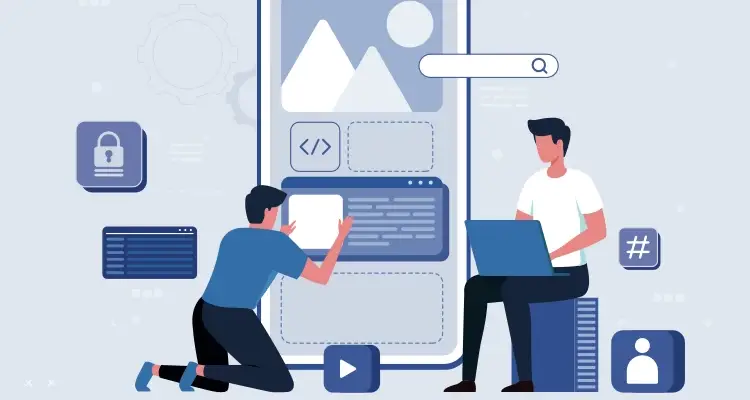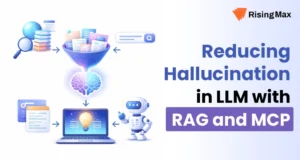The cost to build a business app in 2026 ranges between $15,000 – $300,000.
Well, this is just an approximate range; the final cost of your app depends on the various development factors and the business type for which you want an app.

Businesses increasingly use mobile apps to enhance their operations and engage with customers. However, many business owners wonder, “How much does it cost to develop a mobile app for my business?” The answer to this question can vary significantly depending on factors such as the app’s complexity, the features and functionality required, and the development team’s location.
Understanding The App Development Cost Breakdown
Before diving into the specifics, it’s essential to understand the breakdown of the costs involved in business app development. However, it’s important to note that the figures we mentioned above are just estimates and can vary based on various factors. Understanding the cost breakdown and considering these factors allows you to develop a realistic budget for your business app development project.
The cost of developing a business app can be divided into several key phases, including:
Business Analysis
This phase involves analyzing your business requirements, conducting market research, and defining the scope of the app. The cost of business analysis typically ranges from $1,200 to $11,000.
Design & Prototype
During this phase, the app’s user interface (UI) and user experience (UX) design are created, along with a clickable prototype to visualize the app’s functionality. The design and prototype phase can cost between $2,500 and $10,000.
App Coding
The app coding phase involves writing the code that brings your app to life. The cost of app coding can vary widely depending on the complexity of the app and the development team’s location. On average, app coding can range from $2,000 to $60,000.
Project Management
Effective project management is crucial for the successful development of a business app. The project management phase typically accounts for 10-15% of the total app development budget, with costs ranging from $6,000 to $32,000.
Backend Development
If your app requires a server component or database integration, the cost of backend development should be factored into your budget. Backend development costs can range from $6,400 to $28,000, depending on the complexity of the server component.
Legal & Marketing
Additional costs to consider include app patenting, legal documentation, and marketing efforts to promote your app. These costs can vary depending on your specific requirements and strategies.
Want to know how much does it cost to build your business app?
Contact our experts to discuss your business app idea and how much does business app development cost.
Factors Influencing The Cost Of Business App Development
Several key factors influence the cost of developing a business app. Understanding these factors will help you make informed decisions, optimize your app development budget, and ensure the successful development of your business app.
Features & Functionality
The features and functionality you want to incorporate into your app will also impact the cost. Each additional feature adds complexity to the development process and requires more time and resources. Features like social media integration, in-app purchases, location-based services, and chat functionality can significantly increase the overall cost of app development.
| App Complexity | Cost | Time Frame |
| Basic Features | $20,000 – $50,000 | 2 – 5 Months |
| Intermediate Complexity | $50,000 – $150,000 | 5 – 8 Months |
| Advanced Features | $150,000-$300,000 | 8+ Months |
Platform & Device Compatibility
Developing an app for multiple platforms, such as Android and iOS platforms, will increase the cost compared to developing for a single platform. Each platform has its unique requirements and development processes. Furthermore, ensuring compatibility with different device models and operating system versions can add complexity and cost to the development process.
User Interface (UI) Design
Your app’s design and user interface are crucial for attracting and engaging users. Creating an intuitive and visually appealing UI requires careful planning and design expertise. The complexity of the UI design and the number of screens involved will impact the overall design cost.
Development Team Location
The location of your development team can significantly influence the cost of app development. Development teams based in regions with higher labour costs, such as North America and Western Europe, tend to charge higher rates than teams in Eastern Europe, Asia, or Latin America. Consider the balance between cost and quality when choosing mobile app development firm.
Application Complexity
The complexity of your app plays a significant role in determining the overall cost. Simple apps with basic features, such as user registration, content display, and push notifications, will generally cost less to develop. On the other hand, complex apps that require advanced features, such as real-time data synchronization, machine learning algorithms, and custom integrations, will be more expensive.

App Maintenance & Updates
Once your app is developed and launched, ongoing maintenance and updates are essential to keep it running smoothly and up-to-date. App maintenance costs typically account for around 15-25% of the initial app development cost per year. These costs include bug fixing, performance optimization, security updates, and compatibility with new operating system versions.
Business App Development Process: A Step-by-Step Overview
While the specific steps may vary depending on the development methodology and team, the following provides a general overview of the app development process. Following this step-by-step process and collaborating closely with your development team can ensure a smooth and successful app development journey.
Requirement Gathering & Analysis
The first step in app development is gathering and analyzing the requirements for your business app. This involves understanding your business goals, target audience, and desired features. A detailed analysis helps define the scope of the app and creates a solid foundation for the development process.
Wireframing & Prototyping
The app’s structure and user flow are defined through wireframes and prototypes during this phase. Wireframes are basic visual representations of the app’s screens and functionality, while prototypes provide an interactive simulation of the app’s user interface. These visualizations allow you to test and refine the app’s design before moving forward.
UI/UX Design
The UI/UX design phase focuses on creating an appealing and user-friendly interface for your app. Designers work closely with the development team to ensure that the app’s visuals align with your brand identity and provide an intuitive user experience. This phase includes creating visual elements, selecting colour schemes, and designing user interactions. When incorporating screenshots or mockups into the design process, it’s important to unblur images to maintain clarity and accurately reflect the intended user interface.
Application Development
Once the design is finalized, the development team starts coding the app. This phase involves writing the necessary code, integrating APIs and backend systems, and implementing the desired features and functionality. The development team follows an agile development approach, breaking down the work into sprints and delivering incremental updates.
Testing & Quality Assurance
Testing and quality assurance are crucial to ensure that the app functions as intended and provides a seamless user experience. The development team conducts various tests, including functional testing, performance testing, and compatibility testing, to identify and fix any issues or bugs. This phase ensures that the app meets the highest quality standards before release.
Deployment & Launch
Once the app has passed all necessary tests and is ready for release, it is deployed to the respective app stores, such as the Apple App Store or Google Play Store. The development team helps with the submission process and ensures that the app meets all store guidelines and requirements. A successful launch requires effective marketing and promotion strategies to attract users and generate downloads.
App Maintenance & Updates
After the app is launched, it requires ongoing maintenance and updates to address user feedback, fix bugs, and introduce new features. Regular updates help keep the app relevant and competitive in the market. App maintenance includes tasks such as monitoring performance, optimizing security, and ensuring compatibility with new operating system versions.
Ready To Bring Your App Idea To Life Within Your Budget?
Explore our tailored app development services and discover how we create cost-effective and high-quality apps.
Tips To Optimize Your Business App Development Budget
Developing a business app can be a significant investment. Still, by implementing these tips and strategies, you can optimize your app development budget and ensure a cost-effective and successful app development process.
Prioritize Features
Identify the core features that are essential for your app’s functionality and prioritize them during the development process. By focusing on the most critical features first, you can launch a minimum viable product (MVP) and gather user feedback before investing in additional features.
Choose The Right Development Team
Selecting the right development team is crucial for the success of your app. Consider factors such as expertise, experience, and cost when choosing a development team. Outsourcing development to a team in a region with lower labour costs can help reduce expenses without compromising quality.
Utilize Cross-Platform Development
If your target audience uses multiple platforms, consider cross-platform development frameworks such as Xamarin or React Native. These frameworks allow you to develop a single codebase that can be deployed on both iOS and Android platforms, saving time and resources.
Optimize Design & Development Collaboration
Ensure effective collaboration between the design and development teams by using prototyping tools and maintaining open lines of communication. This helps minimize revisions and eliminates potential delays and extra costs.
Consider Off-the-Shelf Solutions
Explore off-the-shelf solutions and pre-built components that can be integrated into your app. These solutions can save development time and costs, especially for common features like push notifications, payment gateways, and analytics.
Plan For App Maintenance & Updates
Include app maintenance and updates in your budget from the beginning. Regular maintenance and updates are essential for keeping your app secure, bug-free, and compatible with new operating system versions. Planning your quarterly budget around these updates can ensure long-term stability and cost control. Allocating a portion of your budget to app maintenance will help avoid unexpected costs in the future.
In A Nutshell
Developing a business app requires careful planning, budgeting, and collaboration with a skilled development team. By understanding the key factors that influence the cost of app development, following a systematic development process, and implementing cost-saving strategies, you can create a high-quality app that meets your business goals within your desired budget.
Remember, the cost of developing a business app can vary widely depending on factors such as complexity, features, platform compatibility, and development team location. You can successfully navigate the app development journey and achieve your business objectives by conducting thorough research, analyzing your requirements, and making informed decisions.
Are you ready to take your business to the next level with a custom mobile app? Contact RisingMax today to discuss your mobile app development needs and receive a personalized quote.














